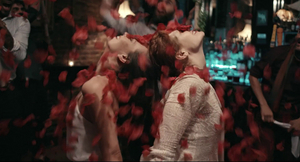Review: AVIVA - DANCE FILM at Virtual Theatrical Premier
 When COVID-19 and BLM protests are happening globally, the virtual theatrical release of AVIVA in New York and Los Angeles this Friday, June 12, 2020, at first glance, may seem ill-timed. However, AVIVA means "spring" therefore making its June release a perfect time for the world to remember a sense of newness and our social, political, and gender-bending thinking.
When COVID-19 and BLM protests are happening globally, the virtual theatrical release of AVIVA in New York and Los Angeles this Friday, June 12, 2020, at first glance, may seem ill-timed. However, AVIVA means "spring" therefore making its June release a perfect time for the world to remember a sense of newness and our social, political, and gender-bending thinking.
The film was shot in Paris and New York and stars choreographer Bobbi Jene Smith as Eden Woman, Tyler Phillips as Eden Man, Zina Zinchenko as Aviva Woman, and Or Schraiber as Aviva Man.
AVIVA is a purposeful palindrome as the main characters Aviva and Eden become men and women interchangeably, creating a more accurate depiction of the complexities of a romantic relationship. Even Eden's 'inner' child comes out to play when shopping for new apartments as Aviva's female side gets bothered by his child-like behavior.
In the opening, writer and director Boaz Yakin, writes a gratuitous and meta masturbational outburst through Eden's opening monologue, away from studio or commercial films. A twenty-year-old verbal org*sm that seemed to be pent up begins by breaking the fourth wall, bare naked on the bed, providing exposition into what's about to happen, like the Chorus in Ancient Greek Theatre, and then becomes voiceover.
Voiceover can become an easy way out to navigate a narrative in dance filmmaking but in this case, it transitioned from one character to the next like threads weaving thoughts, emotions, emails, and verbal expressions together forming incite into the complexities of the characters. The sound design all together is beautifully transitioned.
Cinematography by, Arseni Khachaturan, is exactly right for dance films. The choreography of the camera is as equally important as the dancers in this film. The verbal cues like "one camera" helps the audience to indicate one character with two conflicting perspectives. How often do you fight with yourself? In the end (spoiler alert) Eden's male and female join hands and continue along as if this journey had ended.
The motivation for the first dance scene serves the imagination as several email exchanges between Aviva and Eden. The editing by Holle Singer between two cities and two dancers is effective and fun to watch. And, if you're into it, the generous amount of sex scenes are fun to watch too.
After "connecting in person," Aviva and Eden dance an adagio in all black. A montage of babies and parents and the early sexuality and heart ache of adolescents fast forwards through the Erikson's stages of development to help the audience understand Aviva and Eden.
Each dance scene was timed very well and were pockets of classic dance in cinema scenes: The Bar Dance scene is a more legato version of 'The Rich Man's Frug' of "Sweet Charity," the Coney Island Dance Scene felt like the 'We Go Together' fair scene from "Grease," and the Wedding Dance Scene was like the 'Do You Love Me' scene in "Dirty Dancing." The digital video art dance scenes were reminiscent of Paula Abdul and Janet Jackson music videos. The overall choreography was dynamic, athletic, and attention-grabbing in the warehouse dance scenes and the desert dance scenes. The White Room pas des deux choreography stands out as the essence of pure sensuality.
Ultimately, Aviva is about love and it just so happens that love is a dance whether with self or with others. Not the fairy tale or hollywood kind either, but the passionate, sex-filled, gritty, fucked up kind. Aviva is a demonstration of different aspects of self and how it plays out in the dance of an intimate relationship. By personifying the character's fragmented aspects specifically with the masculine and feminine, we begin to get a deep dive into human behavior and intimacy, addressing so many cliches in a monogamous relationship. Aviva is a beautifully crafted film with a powerful message in 2020.
#AvivaMovie #ArtHousefilm #ContemporaryDance
To learn more about AVIVA and book tickets, please visit: http://www.outsiderpictures.us/movie/aviva/
Reader Reviews

Videos
